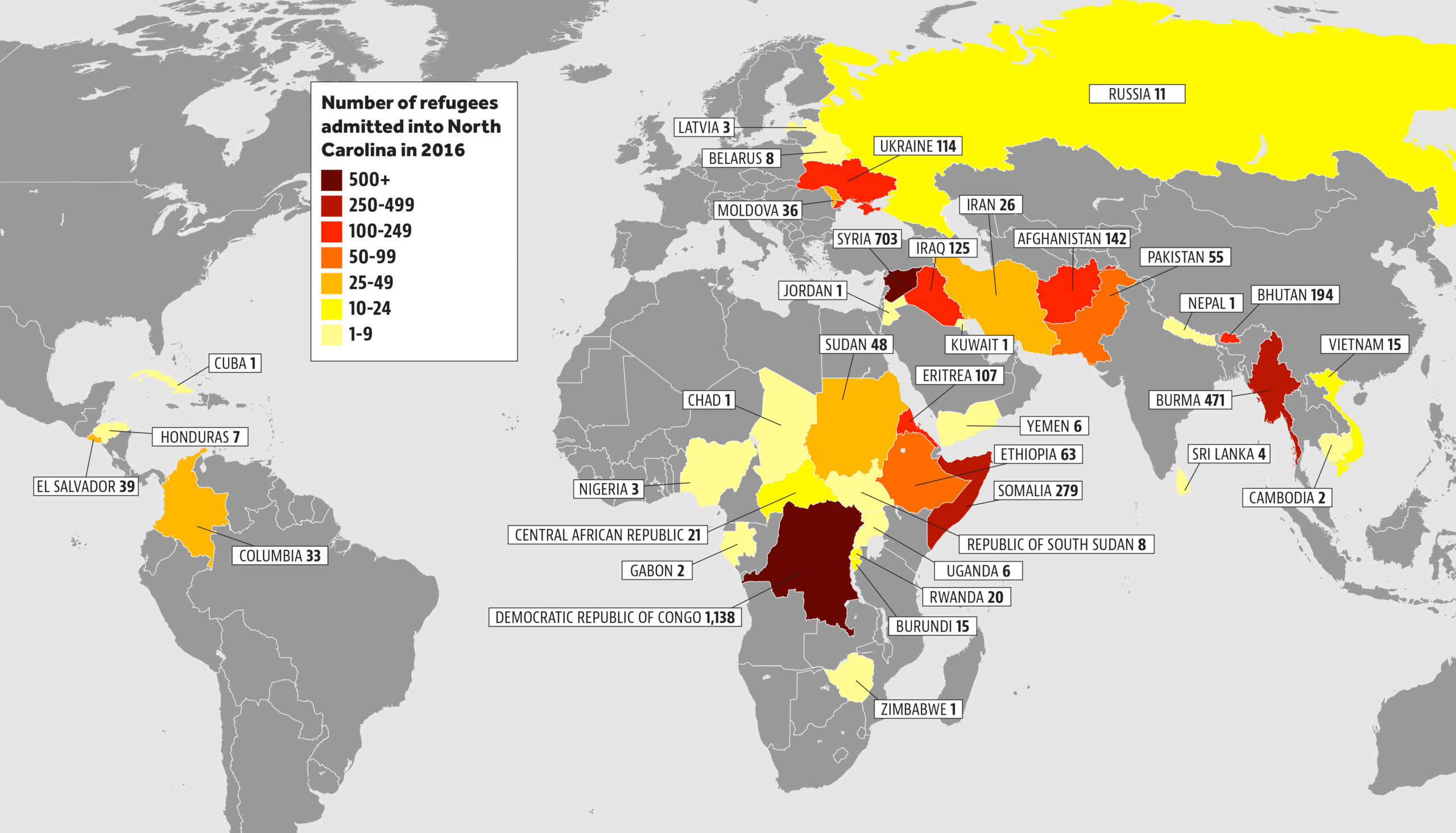As he recited a saying from fugitive cop killer Assata Shakur, Bryan Proffitt’s voice steadily rose above the placard-carrying crowd Friday morning in downtown Durham. A diverse group of more than 100 heard Proffitt and a series of speakers spread a message of peace, love, common humanity — and strident opposition to the Trump administration’s position on immigration and refugee resettlement.
“We have nothing to lose but our chains,” Proffitt said, quoting the former Black Panther convicted of killing a New Jersey state trooper in 1973. She escaped custody and fled to Fidel Castro’s Cuba.

Amid chants of “Forward together, not one step back,” and “No justice, no peace,” they assailed President Trump over his intention to build a border wall with Mexico. They hoped to forestall the executive order Trump signed later Friday. But one expert told Carolina Journal concerns expressed at the rally about the safety of refugees facing religious or ethnic persecution must be balanced by the potential security risks they pose and the financial incentives of some of the nonprofits that handle refugee resettlement.
Durham is among the cities that has seen a rise in refugee resettlement during the Obama administration. North Carolina took in 3,711 refugees in 2016, according to statistics compiled by the Department of State. The Durham office of Church World Service, a national refugee resettlement organization, hosted the Durham rally and others across the nation.
At the Durham rally, the messaging spilled into education spending, income inequality, Black Lives Matter, LGBT rights, Islamophobia, and freeing Palestine.
Protesters denounced crackdowns on illegal immigration, and hoped to forestall Trump’s actions. The order temporarily suspended all refugee resettlements for 120 days, and imposed a 90-day ban on people entering the United States from the jihadi conflict zones of Syria, Iraq, Iran, Libya, Somalia, Sudan, and Yemen. Green card holders are exempt from the 90-day ban.
Proffitt, a high school teacher and president of the Durham Association of Educators, said “a minority of a minority of folks have seized power in this country.”
“They want to put up walls. They want to teach us to hate each other. They want to teach us to suspect each other. They want to teach us that one another is dangerous, and criminal, and terrorists,” Proffitt said.
Investigative journalist James Simpson, a former economist and budget examiner for the White House Office of Budget and Management, said the rallies are effective because they produce real people whose suffering tugs at the heartstrings.
Simpson wrote a book for the Center for Security Policy about refugee resettlement titled “The Red-Green Axis” and has studied the refugee system for years. He said the decision to accept refugees must be done with an awareness of the benefits and costs of doing so.
“You can talk about it from a security standpoint. You can talk about it from a cost standpoint. You can talk about it from an assimilation standpoint, what it’s doing to our culture, how it’s changing our culture,” Simpson said.
“There are lots of different aspects to refugee resettlement that makes it a program that really needs a major overhaul, and the best way to do that right now, and the safest way to do it, is put a pause on the entire program.”
A major conundrum facing nations trying to resettle refugees is that many of the refugees want to return home.
But because there are nine private refugee resettlement contractors including Church World Service, and about 320 subcontractors, “all of whom receive millions of dollars from the federal government to resettle refugees, they go on the warpath to get as many refugees to the United States as they possibly can, and lobby for more,” Simpson said.
The Democratic Republic of Congo accounted for the most refugees in 2016 — 1,138.
There were 1,187 refugees relocated to North Carolina from countries affected by Trump’s executive order on Friday: Syria 703, Iraq 125, Iran 26, Somalia 279, Sudan 48, and Yemen 6.
Durham City Council member Jillian Johnson said she would do “absolutely everything that is in my power to protect every single member of this community from the destructive, racist, xenophobic, Islamophobic policies and actions of the Trump administration.”
Johnson recited a list of policies and social justice actions from the City Council, including affirming its support of resettling Syrian refugees in Durham, to demand federal officials terminate actions against immigrant youths in the city, and to provide faith ID cards to help immigrants access social services and other benefits.
“We owe these people sanctuary, and we should turn no one away,” she said. “If you need sanctuary, I will shelter you. We are ready for a fight.”
Most of the refugees who spoke were less confrontational, imploring Trump to reconsider his policies. They recounted heart-rending episodes about the horrors of war or vast criminal enterprises tearing apart their homelands, of homeless wandering across Africa for two years, of deplorable refugee camp conditions, starvation, and sickness.
Faduma Juma of Somalia, Mimi Fatuma , and Marium Salum of the Democratic Republic of Congo all talked about the difficulty of taking care of their children while awaiting reunification with family members who have not been admitted here as refugees. A Pakistani man and wife identified only as Anees and Ahmad told about snake bites and other dangers refugees encounter.
Griselda Alonso, a Mexican national in the country illegally who was identified as an organizer, was more pointed. She said it is wrong to believe people who entered the country without documents have no rights.
“This country is made of immigrants,” Alonso said, noting that President Trump’s mother and wife emigrated here. “If the president doesn’t want immigrants here he should pack his bags and leave.”